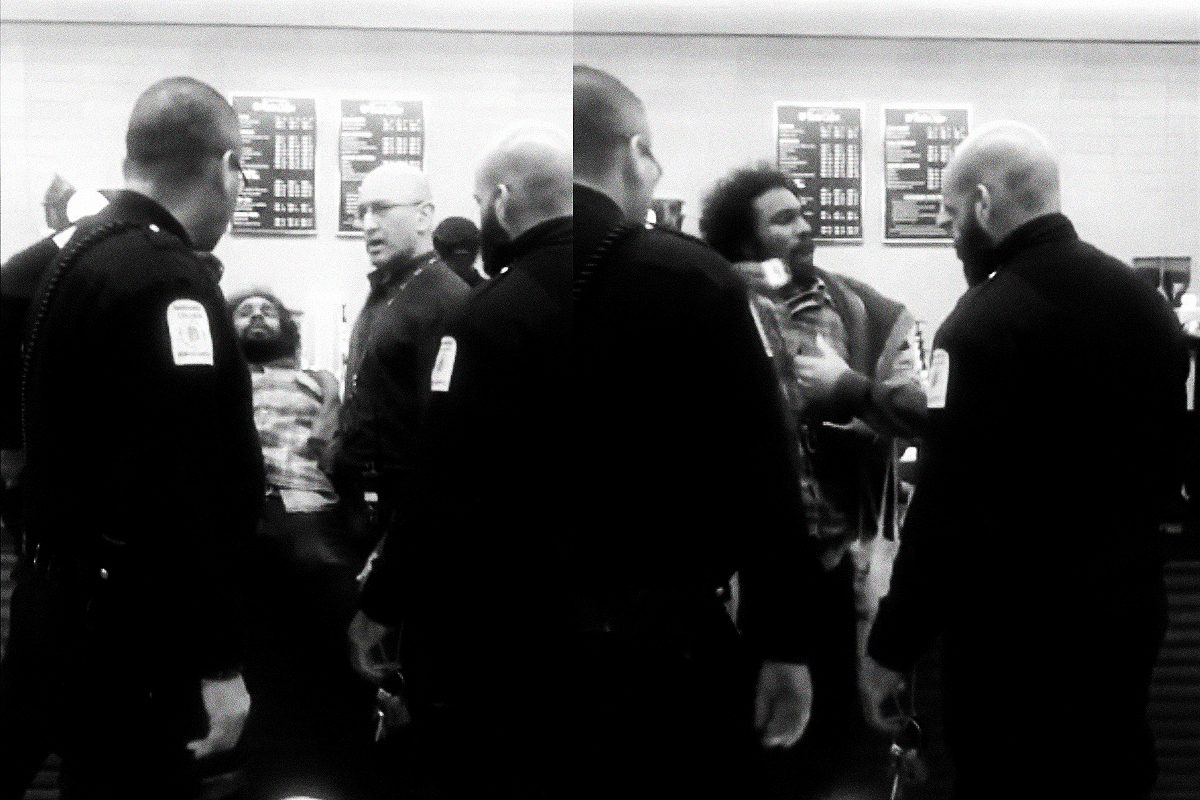Barnard College
Cowardice at Columbia
If you find it implausible that a progressive women’s college in the middle of New York City is enforcing de facto Jim Crow at the security gate, your skepticism is warranted.

On Thursday, April 11, shortly after 11pm, a black Columbia student named Alexander McNab walked through the gates of Barnard college—the undergraduate all-women’s school at Columbia University—after ignoring a security guard’s request to show his student ID. In search of a midnight snack, McNab got all the way to the library canteen before a public safety officer confronted him and asked for his ID a second time, a request McNab once again refused.
Several more officers had arrived on the scene and were continuing to request ID when McNab began yelling. What happened next, depicted in the video below, has become the subject of a national scandal: two officers pushed McNab’s upper body onto the countertop, at which point McNab finally handed over his ID. Public safety proceeded to verify that he was indeed an active Columbia student, at which point they left him alone.
Administrators reacted to the incident by placing the six public safety officers involved on paid leave until outside investigators reach a conclusion about their conduct. In the meantime, administrators have already reached theirs: racism. College deans sent an email to the student body—with the subject line “Addressing Racism on Our Campus”—in which they noted the “continued legacy of anti-black racism” and lamented that “such incidents continue to occur so close to home.”

The president of Barnard noted “a pervasive sense” among black students “that racial bias remains pernicious on our campus.” At a demonstration, student protesters chanted, “No police on my campus!” and “No justice, no peace/Fuck these racist police!” Barnard’s student government association wrote that the McNab “incident reflects systemic racism and police brutality against Black people throughout our nation.”
On the contrary, the McNab affair involved neither police nor brutality. Public safety officers (who don’t carry guns) used the minimum amount of force necessary to get McNab to comply with their request that he identify himself. They pushed him against a countertop for 20 seconds before letting him go. I challenge those who believe this was excessive to name an alternate course of action which would have compelled an unknown man to produce identification.
Everyone who tries to enter Barnard’s campus after 11pm gets carded to ensure that they are a student. This policy exists to protect Barnard students from the subset of men who make a nightly routine out of harassing college-aged women and following them home. Once they clear the front gates, Barnard women know that they’re safe from creeps, because security will bounce anyone without a student ID. (I know this because I live with two Barnard women, both of whom have experienced this exact scenario.)
There are only two ways to implement this policy: words and force. Public safety tried words, and when words failed, they used force. A refusal to employ force in this scenario would have been synonymous with abandoning the policy altogether, giving any creep in New York City free access to a closed, all-women’s campus in the middle of the night. (Try explaining that policy change to Barnard parents, who send their daughters to college in America’s largest city on the assumption that the school will at least try to prevent them from getting stalked, sexually harassed, or worse.)
So why did McNab, a Columbia student with a valid ID, refuse to produce it on demand? It’s unclear because on this point his story has been inconsistent. In an interview with the Columbia Spectator, McNab said that he knew about the ID policy but felt that it was enforced in a racist manner—whites often don’t get carded, he alleged. But in the video, McNab claimed he did not know about the policy, and added that he had never previously been carded when entering Barnard at night. To confuse matters more, in a cable news interview McNab said that no one he knows has ever been carded. Frankly, he seems to be making it up on the fly.
Nevertheless, some media outlets have accepted McNab’s claim that the ID policy is enforced in a racist manner. If you find it implausible that a progressive women’s college in the middle of New York City is enforcing de facto Jim Crow at the security gate, your skepticism is warranted. Yes, some Columbia students (mostly women) have come forward on social media and said that they don’t always get carded at night. I believe them. Those responsible for enforcing public safety—a job that is highly repetitive until it’s not—might occasionally let a person, especially a college-aged woman, through the gates without carding them.

But there’s no reason to suspect that the policy is enforced in a racist manner. All the white Barnard students I have spoken with say that they always get carded. Morgan Raum, a senior at Barnard said, “I have been asked to show my ID after 11pm on Barnard’s campus every time that I can remember, and I am a very light skinned Jewish woman.” My roommate, a blond-haired, blue-eyed white woman told me that in her three years at Barnard, she has never entered campus after 11pm without getting carded. Personally, I’ve never seen anyone—not even a white woman—slip through the gates at night without being asked to show ID.
In the absence of data on carding disparities by race, all we have to work with are competing anecdotes. It’s telling, however, that no white people have come forward and said they’ve walked into Barnard at night with impunity, refused multiple requests to show ID, yelled defiantly inside a library in the middle of the night, and been given a pass by campus security. Until a white person does come forward with such a story, the likeliest explanation of the McNab affair is that the officers were reacting not to his skin color but to his petulant histrionics.
Others have criticized Barnard security for sending too many officers to begin with. This criticism, however, fails to take into account the context in which security guards operate. To say that sending six officers was “excessive” ignores the fact that public safety officers, lacking clairvoyance, do not know in advance if an unknown man will turn out to be a harmless student, requiring one officer at most, or a mass shooter, requiring a small army. What’s more, if McNab had turned out to be a dangerous individual, the students criticizing public safety officers for their “excessive” response would now be angry that those same officers didn’t arrive at the scene faster and in greater numbers.
“Cowardly” is the only word that properly describes the way in which administrators have scapegoated public safety officers for enforcing a policy that administrators themselves put in place. Cowardly, too, is the way in which they have held McNab to a comically low standard of consistency in his storytelling. We are asked to believe that McNab was both aware and unaware of a policy which he had seen enforced in a racist manner but had also never seen enforced at all, not even on himself. Obviously, racism must be taken seriously. But these days mere accusations of racism, as if by magic, shut down the skeptical minds of otherwise intelligent people. In the wake of Jussie Smollett’s infamous hate crime hoax, we should all know better.

The only winner to emerge from this fiasco is McNab himself. A talented and prolific essayist in the anti-racist mold, McNab has received national attention over this incident and has been invited to pen a personal essay about his experience for the Columbia student newspaper. This he can add to an already impressive collection of pieces bemoaning his experience as the proverbial black-man-in-America. For twenty seconds of physical discomfort, that’s not a bad outcome.
I don’t mean to imply that McNab orchestrated this incident in the manner of Jussie Smollett. My guess is that he is a mostly sincere individual with a commitment to anti-racism so strong that, from the outside, it can seem indistinguishable from paranoia and bad faith. Put differently, the McNab affair would not be the first time an honest zealot saw racism where it didn’t exist. Nor would it be the first time that a community ostensibly dedicated to the pursuit of truth chose to entertain a person’s delusions of victimhood out of a sense that being on the right side of history is worth being on the wrong side of reality.







